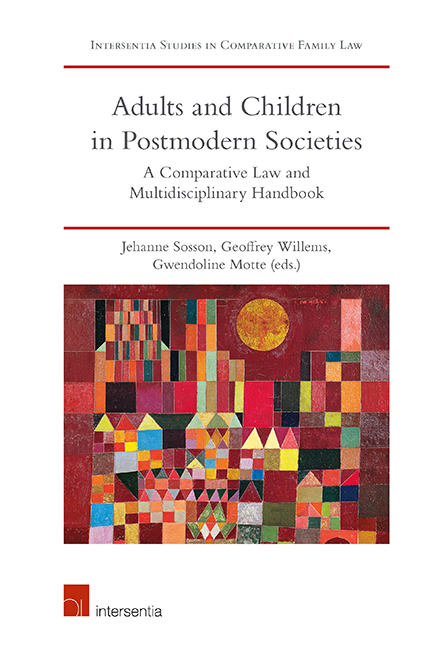Book contents
- Frontmatter
- Contents
- List of Cases
- List of Contributors
- Introduction
- PART I NATIONAL REPORTS ON LEGAL REGULATIONS OF RELATIONSHIPS BETWEEN ADULTS AND CHILDREN
- PART II INTERDISCIPLINARY APPROACH
- PART III INTERNATIONAL LAW INSIGHTS
- International Human Rights Law as a Basis for Reconstructing Legal Relationships between Adults and Children
- Private International Law as a Basis for Reconstructing Legal Relationships between Adults and Children: Four Illustrations
- PART IV COMPARATIVE APPROACH
- General Conclusion: The Challenge of Transparent and Inclusive Parenthood/Parentality in a Pluralist and Cosmopolitan Context
- About the Editors
Private International Law as a Basis for Reconstructing Legal Relationships between Adults and Children: Four Illustrations
from PART III - INTERNATIONAL LAW INSIGHTS
Published online by Cambridge University Press: 26 June 2019
- Frontmatter
- Contents
- List of Cases
- List of Contributors
- Introduction
- PART I NATIONAL REPORTS ON LEGAL REGULATIONS OF RELATIONSHIPS BETWEEN ADULTS AND CHILDREN
- PART II INTERDISCIPLINARY APPROACH
- PART III INTERNATIONAL LAW INSIGHTS
- International Human Rights Law as a Basis for Reconstructing Legal Relationships between Adults and Children
- Private International Law as a Basis for Reconstructing Legal Relationships between Adults and Children: Four Illustrations
- PART IV COMPARATIVE APPROACH
- General Conclusion: The Challenge of Transparent and Inclusive Parenthood/Parentality in a Pluralist and Cosmopolitan Context
- About the Editors
Summary
INTRODUCTION
Private international law is that field of the law that regulates the interaction between the private law systems of different States. It is an often forgotten field of law, also in comparative law projects.
In the area of family law the European Union (EU) legislator has been very active over the past 15 years. Many aspects of private international law have been unified. There is EU legislation on divorce, parental responsibility, maintenance, matrimonial property, and the property consequences of registered partnerships. On the international level, the Hague Conference on Private International Law has concluded conventions on child protection (including parental responsibility), the civil aspects of international child abduction, inter-country adoption and maintenance.
The area of the establishment of parenthood is still governed by national private international law rules. As is clear from the national reports in this volume, the rules of substantive law are diverse. Where substantive laws are diverse, it is difficult to agree on common private international rules. Even in the fields where the EU has legislated, the most recent efforts did not result in common private international law instruments throughout the EU, but only in instruments of enhanced cooperation. This is the case for divorce (applicable law), matrimonial property and the property consequences of registered partnerships. The EU has not yet endeavoured to take initiative in the field of parenthood. The International Commission on Civil Status has in the past tackled this issue, but their Conventions deal mainly with children born out of wedlock. They are old and have not been broadly ratified. They do not establish common private international rules, but oblige Contracting States to recognise certain aspects of parenthood from abroad. Since 2015, the Hague Conference on Private International Law has been working on a project on parentage and surrogacy. The work is currently done by an Expert Group and it is as yet unknown what the outcome will be.
- Type
- Chapter
- Information
- Adults and Children in Postmodern SocietiesA Comparative Law and Multidisciplinary Handbook, pp. 707 - 722Publisher: IntersentiaPrint publication year: 2019
- 1
- Cited by



